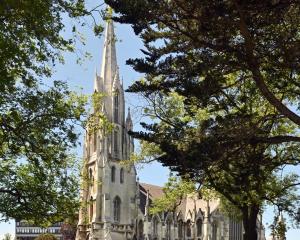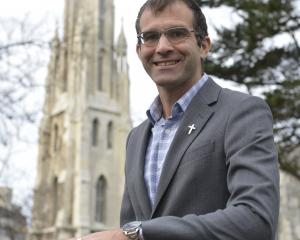Richard Dawson suggests that even, or perhaps especially, at Easter, God is concerned with the "ordinary stuff" of people's lives.
Dunedin was founded by virtue of a spiritual vision.
That vision was expressed in the form of two very simple goals: the establishment of a Christian Society, probably meaning a church run along democratic lines, and the availability of education to the highest levels for the children of those early settlers.
Hence the establishment of the University of Otago by the Presbyterian Church in partnership with the local government of the day.
These goals may well seem a mile from what we might call spiritual today, but they reflect a uniquely Christian conception of spirituality.
At the heart of God's interest in humankind is a love for and understanding of the material aspects of our life.
In other words, the spiritual does not exist for its own sake but for the sake of others.
In the case of the Christian God, we are the others.
God is interested in your life not simply because you have an eternal future but because you live a life in the here and now.
Jesus made it quite clear that heaven and hell begin, at least, in the here and now and he was greatly concerned that we did not make our lives hellish.
This meant a vital interest in such worldly things as whether people were healthy, whether they had enough to eat, whether they treated each other justly and whether they created a community in which people felt loved and accepted.
All these very material things constituted, for this most spiritual of men, the core of his short ministry on Earth.
In what sense, then, was this a spiritual life?
It was so because Jesus constantly reminded those around him that this deep interest in and love for the material aspects of human life was made possible because of his relationship to God.
The power to love in a sustained fashion all that makes us human, comes from God.
Such was his commitment to God that at Easter time we celebrate his death on the Cross at the hands of largely the same people he had loved all his life. He was never found guilty of any crime worthy of death.
He was pronounced innocent by the authorities of the day, but under political pressure they still allowed him to be killed. This was approved by the very people who had benefited from his work just days before.
Yet this evil act is considered by all orthodox Christians to be the guarantee of God's love for humanity, in all its earthiness which he had demonstrated.
Indeed, this event is for all Christians the centre of our spirituality.
How can this be?
A part of the reason for this is simply the notion that if God can love us at our worst, we can trust that love.
If God can relate to us even when we deny God's very existence, then we can be sure that this relationship, at least from God's side, is secure.
And it is.
This is the great message of Easter.
Gods knows us at our very worst and does not reject us. God understands, indeed loves the stuff of our humanity; the most basic of our needs, our feelings, our cravings.
God is not repelled by these things. Furthermore, God sees the very worst of us; the wrongs we've done and the right we haven't done and still we are not rejected.
So God is interested in the way our society runs, the education our children receive, the healthiness of our eating habits.
These things are essentially spiritual matters because they are things that matter to God.
But how they matter can only be discerned in relation to the God who made them.
This is another key theme of Easter.
A world run apart from God defaults to chaos and injustice, even in its most religious or ethical form.
The Jews were not immune to this, and neither is the Church.
It has had to learn again and again that religious form does not equate to relationship, just as a marriage contract does not equal a good marriage.
God, however, is still interested in the ordinary stuff of our lives.
Indeed, God loves this stuff.
Give God a chance this Easter.
Make some space again for the God who is interested in you.
• The Rev Richard Dawson is pastor of St Stephen's/Leith Valley Presbyterian Church.












